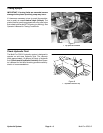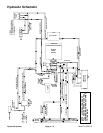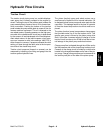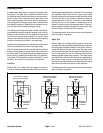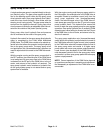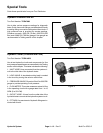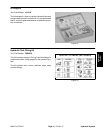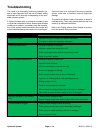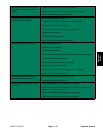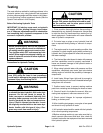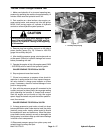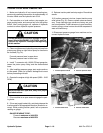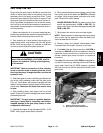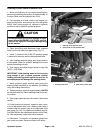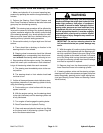
Multi Pro 5700--DHydraulic System Page 4 -- 14
Troubleshooting
The cause of an improperly functioning hydraulic sys-
tem is best diagnosed with the use of proper testing
equipment and a thorough understanding of the com-
plete hydraulic system.
A hydraulic system with an excessive increase in heat
or noise has apotential for failure. Should either ofthese
conditions be noticed, immediately s top the machine,
turn off the engine, locate the cause of the trouble, and
correct it before allowing the machine to be used again.
Continued use of an improperly functioning hydraulic
system could lead to extensive internal component
damage.
The chart that follows contains information to assist in
troubleshooting. There may possibly be more than one
cause for a machine malfunction.
Refer to the Testing section of this Chapter for precau-
tions and specific test procedures.
Problem Possible Cause
Hydraulic oil leaks. Hydraulic fitting(s) or hose(s) are loose or damaged.
O--ring(s) or seal(s) are missing or damaged.
Foaming hydraulic fluid. Oil level in reservoir is incorrect.
Hydraulic system has wrong kind of oil.
Piston and/or gear pump suction line has an air leak.
Water in hydraulic system.
Hydraulic system operates hot. Oil level in reservoir is incorrect.
Hydraulic hose is kinked.
Oil is contaminated or incorrect viscosity.
Brakes are engaged or sticking.
Piston pump by--pass valve is open or damaged.
Hydraulic oil cooling system is not operating properly.
Charge pressure is low.
Traction circuit pressure is incorrect.
Wheel motor(s) or spray pump motor is/are worn or damaged.
Gear pump or piston (traction) pump is worn or damaged.
Machine operates in one direction
only.
Traction control linkage is faulty.
System charge check v alve and/or system relief valve is defective.
Traction pedal is sluggish. Traction control linkage is stuck or binding.
Piston pump manual servo control assembly is damaged.
Piston pump or wheel motor(s) are worn or damaged.
Charge pressure is low.



